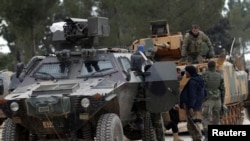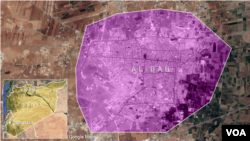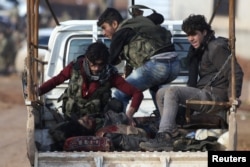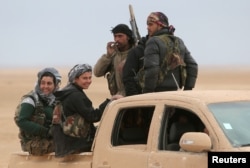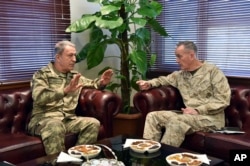Islamic State (IS) fighters have reportedly retaken several strategic positions in the northern Syrian town of al-Bab amid fierce clashes with Turkish-backed rebels who are trying to oust the group from the town.
Despite intensive Turkish airstrikes on the besieged town, IS managed to wage a surprise attack on incoming Syrian rebels and Turkish troops, forcing them to retreat from at least three districts in the northern part of al-Bab, local media reports said.
“Al-Bab is the last main stronghold for IS in Aleppo province,” said Sadradeen Kinno, a Syrian researcher who closely follows IS activities in the country.
“They [IS militants] have brought large military reinforcement into the town to fight Turkish forces who have no experience in urban warfare,” he told VOA.
IS has held thousands of civilians inside the city, hoping to use them as human shields to slow the advances of rebel forces and their Turkish allies, local groups reported.
“At least 45 civilians were killed in recent Turkish shelling and airstrikes on al-Bab,” said the Syrian Observatory for Human Rights, a group that has researchers across the country.
Recent attacks by IS came after the Turkish military said it was “near victory” in their months-long offensive to push IS fighters out of al-Bab, which has been under militant control for more than two years now.
“Turkish military and [the rebel group] Free Syrian Army have taken control of most of the town,” the Turkish military said in a statement released Friday.
Turkish officials said their goal after removing IS fighters from al-Bab is to go after them in their de facto capital of Raqqa.
“After [al-Bab] there is one more target left and that is Raqqa,” said Turkish President Recep Tayyip Erdogan, in an interview with the pan-Arab al-Arabiya channel.
But analysts say that it would be difficult for Turkey to conduct an operation on Raqqa alone, given the complicated political dynamics on the Raqqa front.
“Turkey may take part in a coalition operation, but it will not go there alone,” said Metehan Demir, a Turkish military affairs analyst.
Meanwhile U.S.-backed Syrian Democratic Forces (SDF), a Kurdish-led coalition has made significant advances on IS near Raqqa, seizing tens of towns and villages in the north and western parts of the province.
Turkey’s relationship with SDF could potentially make things complicated should Turkey choose to wage operations on Raqqa in the future.
Turkey considers the Kurdish YPG, the main element of the SDF, as a terrorist organization and fears that Kurdish military gains in northern Syria will empower the outlawed Kurdistan Workers’ Party (PKK) that is engaged in a bloody war against government forces in Turkey.
The chairman of the U.S. Joint Chiefs of Staff, General Joseph Dunford, assured his Turkish counterpart General Hulusi Akar on Friday at NATO's Incirlik airbase in southern Turkey the United States is considerate of Turkey’s concerns and that it chooses Kurdish fighters with care when lending its support to rebels fighting Islamic State.
But Turkey continues to claim that U.S is actively supporting YPG which Turkey views as an ally of the outlawed PKK. Both the United States and Turkey view PKK as a terrorist organization.




